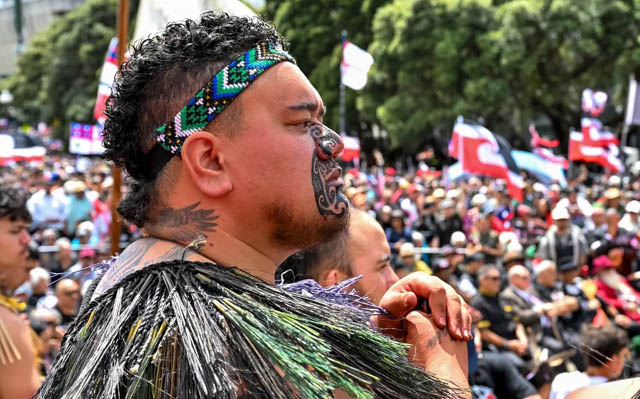News Flash
News Flash

WELLINGTON, Feb 6, 2025 (BSS/AFP) - Bare-chested Maori bellowed haka chants Thursday to mark New Zealand's national day, holding spirited ceremonies as critics accuse the government of eroding Indigenous rights.
The national holiday marks the 1840 Treaty of Waitangi between Maori chiefs and colonising British forces, widely seen as the birth of modern New Zealand.
More than 80,000 people were expected to travel to Waitangi in northern New Zealand for the annual procession of speeches, song and protest.
This year's events have been charged by the introduction of a bill that seeks to redefine the founding treaty.
"It seems our spouse, the Crown, has filed for divorce while we were blissfully unaware," Methodist Church leader Te Aroha Rountree said in an early-morning Waitangi Day speech.
Scores of Maori men in traditional garb lined the shore outside the Waitangi treaty grounds for a mass haka performance on Thursday morning.
A fleet of traditional "waka" canoe were then launched into calm waters for a ceremonial parade.
Elsewhere in New Zealand, hundreds of protesters marched through major cities such as Wellington and Christchurch.
Prime Minister Christopher Luxon was criticised for steering clear of Waitangi, where past prime ministers have travelled to meet with leading Maori.
He instead visited a "marae" -- or Maori meeting house -- in New Zealand's South Island.
Government minister David Seymour, who leads a minor party in New Zealand's governing coalition, was heckled during a speech at Waitangi a day earlier.
- Hostile reception -
Many in the crowd turned their backs as he spoke before one protester snatched away the microphone.
Seymour is the architect of the contentious "Treaty Principles Bill".
The bill would wind back "special rights" currently enjoyed by Maori, according to Seymour, who is an arch critic of affirmative action.
Maori remain far more likely to die early, live in poverty, or wind up in prison.
Seymour's bill lacks the numbers to pass into law but its introduction has stirred fierce debate.
More than 35,000 demonstrators poured into the capital Wellington last year to rail against it in one of the country's biggest-ever protests.
Critics see the bill as an attempt to strip long-agreed rights from the country's 900,000-strong Maori population.
Former conservative prime minister Jenny Shipley has said the mere thought of such a bill threatened to "divide New Zealand in a way that I haven't lived through in my adult life".
Seen as the country's founding document, the Treaty of Waitangi was signed in 1840 to bring peace between 540 Maori chiefs and colonising British forces.
Its principles today underpin efforts to foster partnership between Indigenous and non-Indigenous New Zealanders and protect the interests of the Maori community.